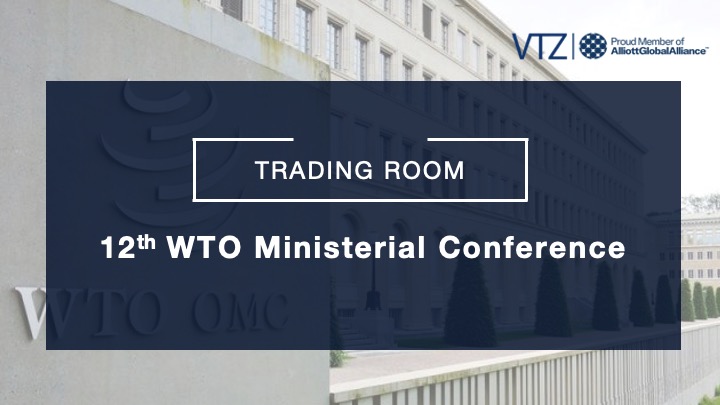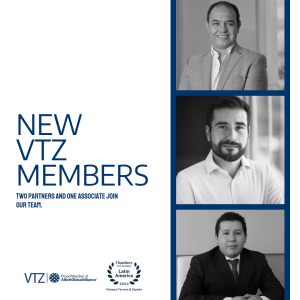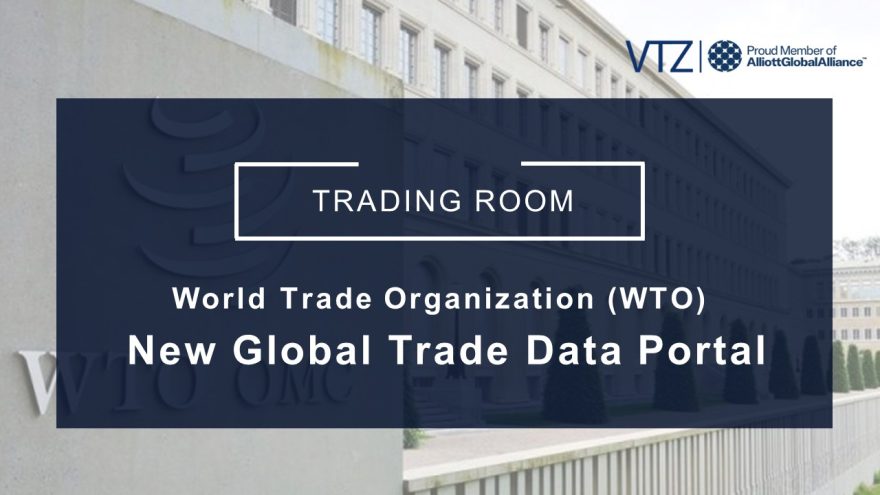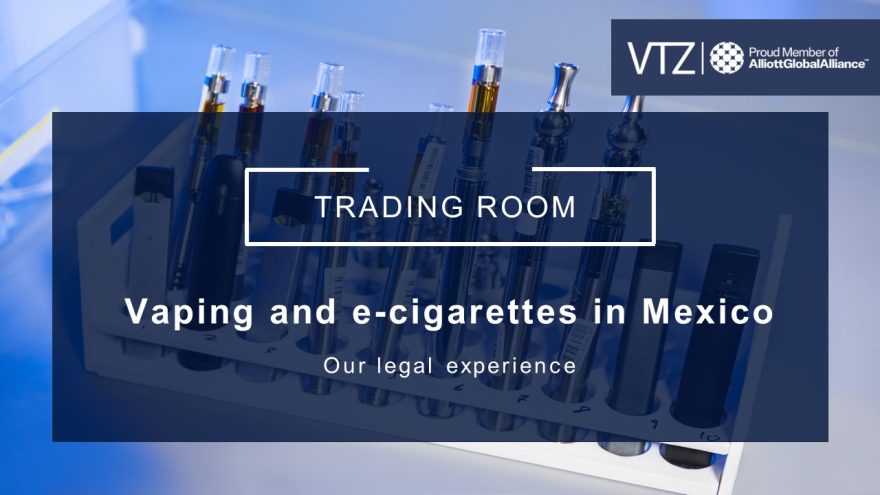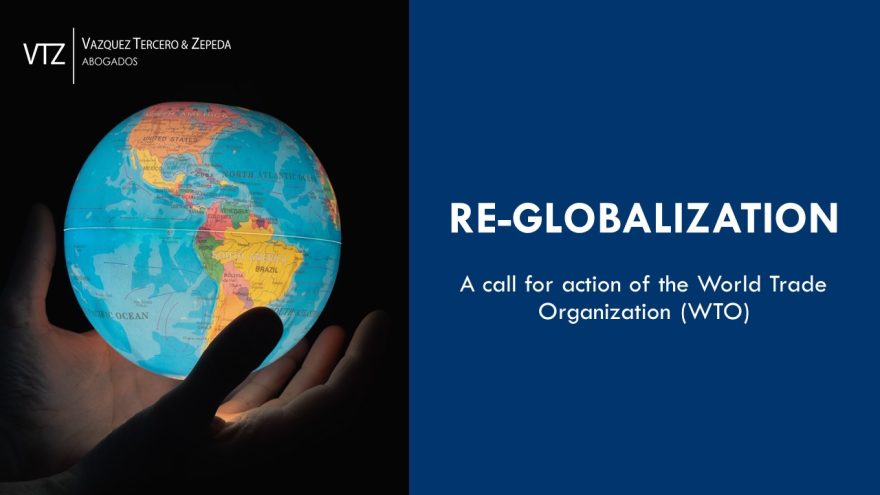12th WTO Ministerial Conference: An Achievement or Failed Attempt?
In this edition, we present the most relevant developments and setbacks of the 12th Ministerial Conference of the World Trade Organization (WTO). This Conference was originally scheduled for June 2020 but was delayed due to the COVID-19 pandemic. Finally, the conference was held from June 12 to 17, 2022 in Geneva, Switzerland.
What happened in the 12th WTO Ministerial Conference?
In simple terms, the Ministerial Conference is a forum where representatives of WTO Members discuss, review, and adopt decisions. This year, Members mainly discussed the Agreement on Fisheries Subsidies (AFS), e-commerce, patents on COVID-19 vaccines and food security.
However, the 12th Ministerial Conference was also characterized by not giving a response on significant issues. In particular, WTO Members failed to address the institutional crisis of the Appellate Body (AB) and the WTO Dispute Settlement Mechanism.
#ICYMI On 17 June at #MC12, WTO ministers reached historic agreements on:
— WTO (@wto) June 18, 2022
▶️ Response to food insecurity
▶️ @wfp food purchases exemption
▶️ WTO response to the pandemic
▶️ #TRIPS
▶️ #Ecommerce moratorium
▶️ #FisheriesSubsidies
More: https://t.co/nrqp96nBmb pic.twitter.com/3yBdPcaviD
The Agreement on Fisheries Subsidies at the 12th WTO Ministerial Conference
The first highlight of the 12th Ministerial Conference is the Agreement on Fisheries Subsidies (AFS, Agreement on Fisheries). According to the International Union for Conservation of Nature, this agreement has been in the negotiating table since 2001, when several WTO Members expressed their concern about the excessive exploitation of marine resources. In particular, several countries expressed their dissatisfaction with overfishing, illegal, unregulated and unreported fishing. In fact, sustainable fisheries are part of the UN Sustainable Development Goals (SDGs).
Previously, WTO Members had been unable to reach an agreement because the United States, the European Union and China had different views regarding forced labor and fishing in international waters (Reuters).
The Pros and Cons of the Agreement on Fisheries Subsidies
The Agreement on Fisheries is aimed at protecting marine life and eliminating harmful fishing practices. Specifically, the AFS prohibits subsidies related to:
Nevertheless, the Agreement on Fisheries is not a definitive solution to the crisis. The main criticism is that AFS does not includes provisions concerning subsidies to fishermen from one Member who fishes in the sea of another Member. Also, AFS does not tackle harmful subsidies (OCOF), which are the main cause of overfishing. Such subsidies reduce fishermen’s operating costs and increase fishing capacity. These harmful subsidies were a central matter in AFS’s initial drafts, and they were not included in the final text of the agreement, unfortunately.
Experts criticize that the AFS contains «significant loopholes.» The Agreement on Fisheries expressly prohibits subsidies to fish overfished stocks but does not prohibit subsidies that trigger overfishing (The Guardian). In other words, the AFS does not prevent overfishing, and AFS only comes into action when the problem has already occurred. In this sense, the AFS does not solve the issue of subsidies that are a main cause of overfishing.
Entry into force
On the one hand, Agreement on Fisheries will enter into force once two-thirds of WTO Members accept the AFS. Moreover, the agreement will only be binding on those Members that accept it.
Additionally, the AFS provides a 2-year transition period for developing countries to comply with the provisions of the Agreement. In other words, developing countries may continue to provide subsidies for illegal, unregulated, and unreported fishing activities, as well as fishing of overexploited stocks, during the first 2 years of its entry into force.
Comprehensive disciplines
On the other hand, the Agreement on Fisheries provides that if the comprehensive disciplines are not adopted within 4 years of its entry into force, the AFS will be terminated immediately. Although “comprehensive disciplines” is not defined, some experts explain that AFS may be referring to disciplines against harmful subsidies.
Even so, will Members be able to adopt «comprehensive disciplines» in just 4 years after more than 20 years to reach this point? There is a diversity of positions on how to address this issue, which may complicate the continuity of the Agreement on Fisheries. For example, India originally proposed a 25-year transition period for developing countries.
Moreover, it is also difficult to predict how effective the Agreement on Fisheries will be in just 4 years. Let’s hope for the best.
Solution to the Appellate Body crisis until 2024? A pending agenda.
At the 12th Ministerial Conference, WTO Members acknowledged the dispute settlement mechanism crisis because the Appellate Body is not functioning. However, the concern was insufficient since Members did not propose solutions to the crisis, agreeing to address the issue in 2024.
It should be noted that the Appellate Body crisis has been unsolved for more than 3 years. Recently, on April 27, 2022, Mexico submitted for the 53rd time a proposal to initiate the selection process for the missing Appellate Body members. However, once again, the United States objected, considering that the dispute settlement mechanism requires only one instance, i.e., only the Special Group.
Multi-Party Interim Appeal Arbitration Arrangement (MPIA)
In response to the lack of the Appellate Body, 18 WTO Members, including Mexico, adopted the Multi-Party Interim Appellate Arbitration Arrangement (MPIA). However, the United States, one of the most active members in WTO disputes, has not agreed to join the MPIA.
Currently, there is a dispute before an «Appellate Arbitration», but there has not yet been a report from an appellate panel per the MPIA (wtoplurilaterals). In fact, there are 8 ongoing disputes that could trigger the MPIA.
It is also noteworthy that the MPIA does not preclude «paralyzed» panel reports, as this mechanism is only available to members that are party to this agreement. Therefore, the MPIA is far from covering the absence of the Appellate Body.
Patents for COVID-19 vaccines: The biggest obstacle.
Another important issue is the ministerial decision of the Agreement on Trade-Related Aspects of Intellectual Property Rights (TRIPS). This ministerial decision establishes that «eligible Members» may produce, distribute and export COVID-19 vaccines without authorization from the patent holder through a compulsory license. What is notable is that Members can export the vaccines, since compulsory licenses are intended for the supply of the domestic demand per TRIPS. This authorization will last for 5 years from the adoption of the decision in question.
Admisible members
Initially, the United States proposed that countries exporting more than 10% of total global vaccine exports could not be considered «eligible members» and therefore not benefit from the ministerial decision.
However, China rejected such proposal. In the end, it was agreed to consider all developing countries as eligible members. However, those countries that have the capacity to produce vaccines must voluntarily make a binding commitment not to use the benefits of the decision. In this regard, it is important to keep in mind that China agreed in good faith not to make use of the provisions available to «eligible members».
Was the target really fulfilled?
The ministerial decision on TRIPS has been strongly criticized. On the one hand, Amnesty International argues that this decision is insufficient because it does not include anything on curative treatments or COVID-19 testing. On the other hand, the International Federation of Pharmaceutical Manufacturers and Associations (IFPMA) considers that the decision discourages medical innovation and the production of new treatments.
The discussion on COVID-19 patent products dates back to 2020, when India and South Africa’s submitted an initiative to end patents and allow access to and distribution of vaccines and other products against the COVID-19 pandemic. However, this proposal was rejected.
After 2 years of arduous negotiations, the 12th Ministerial Conference could have been the perfect scenario to take up the issue of full exemption of patents on both vaccines and diagnostic and treatment products against COVID-19, initially proposed by India and South Africa. However, Members only addressed COVID-19 vaccines in the ministerial decision, while deciding to postpone the issue of production and supply of COVID-19 diagnostics and treatment products (no later than 6 months after the adoption of the ministerial decision).
For more information, we recommend the following reading:
The ministerial decision fails to address the real needs of developing or least developed countries.
It should be noted that the «least developed countries» have been hit the hardest by the pandemic with an average of 1% to 15% of their population currently vaccinated. Although the ministerial decision exempts the patent holder’s authorization to produce, distribute and export vaccines, it is difficult to imagine that the least developed countries have the capacity to produce their own vaccines to cover the rest of the unvaccinated population.
Therefore, experts argue that the ministerial decision on TRIPS will not provide a solution to the real problems faced by developing and least developed countries nowadays. However, it is also argued that a full waiver of COVID patents would have a negative message since it would have taken away the incentives regarding research and development in the event of a future pandemic (Thinkglobalhealth).
E-commerce
Since 1998, WTO Members have agreed to a moratorium on the imposition of customs duties on electronic transmissions. At the ministerial conference, there was an expectation of an agreement. However, this was not possible.
There are two conflicting positions. On the one hand, there are members who advocate that cross-border electronic transmissions should not be subject to customs duties. Indeed, no one can deny that there is a practical problem in collecting duties on electronic transmissions. On the other hand, other Members, such as India, consider that they have lost revenue from the moratorium on not applying customs duties on electronic transmissions (Policy Circle).
In this light, WTO Members simply agreed, through a ministerial decision, to extend the moratorium and the current practice of not imposing customs duties on electronic transmissions. WTO Members have until the 13th Ministerial Conference (or March 31, 2024) to reach an agreement on the imposition of customs duties on electronic transfers.
If no agreement is reached (or the moratorium is extended again), India could eventually impose customs duties on electronic transmissions. However, countries adopting such measures would affect their own consumers and businesses consuming or requiring digital services.
It is important to consider that certain countries have addressed the issue of e-commerce in modern free trade agreements, such as United States-Mexico-Canada Agreement (USMCA) and the Comprehensive and Progressive Agreement for Trans-Pacific Partnership (CPTPP). In this regard, Mexico has agreed not to impose customs duties on electronic transmissions.
VTZ Commentary on the 12th WTO Ministerial Conference
Despite the efforts, the 12th Ministerial Conference was silent on vital issues, such as the institutional crisis of the Appellate Body. It is clear that the 12th Ministerial Conference was a space where several significant international trade matters were on the multilateral table, and important steps were made. However, we consider that the results fall far from solving problems at their root.
Moreover, it is likely that the AFS can be terminated, as it is difficult for developing countries to adopt comprehensive disciplines within 4 years, when India initially requested a transition period of 25 years to comply with the provisions of the agreement.
The 12th Ministerial Conference was notable for seeking solutions to environmental and sanitary issues, such as fisheries and COVID-19. In this regard, we consider it noteworthy that, at least, there was a Fisheries Agreement, after more than 20 years of negotiation. On this point, the international community acknowledged the important diplomatic work of the Chairman, Santiago Wills, Ambassador of Colombia (The Financial Times).
The @WTO is back! Among many amazing deliverables, and after 21 years, members concluded the multilateral Agreement on Fisheries Subsidies 🐠🐟 during #MC12. Great contribution to Ocean sustainability, fisheries, and the livelihoods of millions of people. Historic. Well done! pic.twitter.com/ng2EgWUklM
— Santiago Wills (@WillsSantiago) June 17, 2022
Regardless of this first step, it will be necessary to observe what results materialized in the coming years in order to assess the achievements of the 12th Ministerial Conference.
In addition, it also seems that we will wait a couple more years to see what happens with the Appellate Body crisis, as well as whether countries reach an agreement on e-commerce at the multilateral level.
Need more information?
VTZ is a firm specialized in International Trade and Customs and IMMEX with a team with extensive experience, contact our members today:

